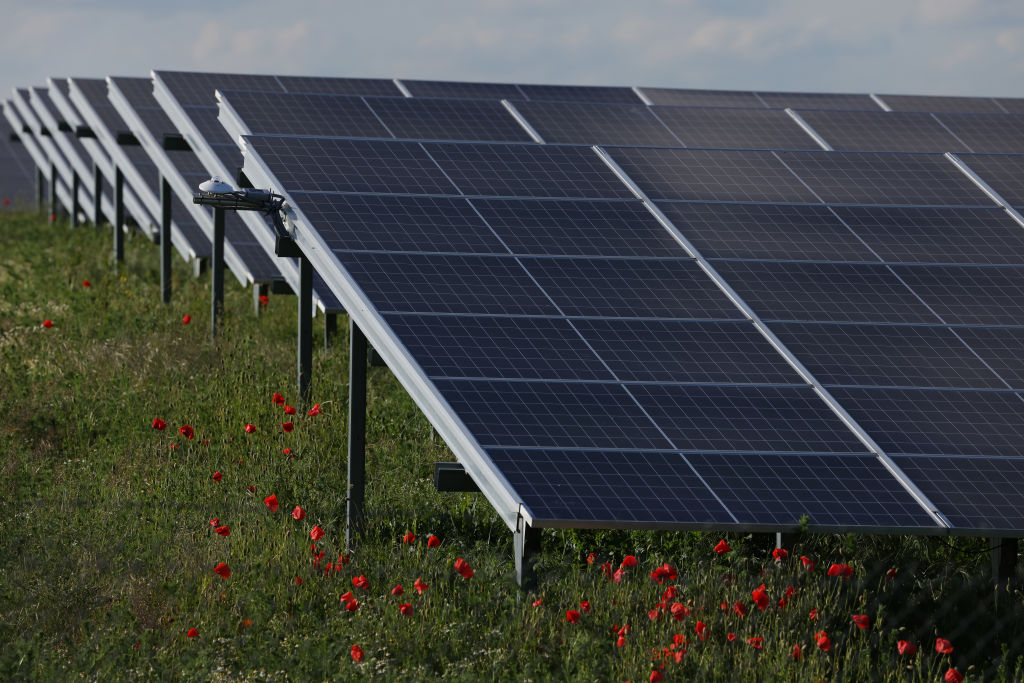Biden moves to shore up U.S. solar projects, boost domestic production


A free daily email with the biggest news stories of the day – and the best features from TheWeek.com
You are now subscribed
Your newsletter sign-up was successful
President Biden on Monday issued a series of executive orders to ensure that large-scale solar energy projects have enough foreign-made panels and cells to continue while simultaneously boosting domestic production so Asian imports are less necessary. Biden's actions come as a Commerce Department investigation on possible Chinese solar panel dumping and other trade violations threw the U.S. solar energy into turmoil, putting projects on hold amid fears of retroactive tariffs.
Biden's most significant executive action on Monday was declaring a two-year tariff exemption on solar panels from Southeast Asia. The White House said the tariff holiday would not interfere with the Commerce Department's investigation into whether China was evading export limits by moving heavily subsidized solar panels and cells through factories in Thailand, Vietnam, Malaysia, and Cambodia, a charge China denies. A small number of those companies could still face retroactive tariffs of up to 240 percent when the investigation concludes.
Biden also invoked the Defense Production Act to help jump-start the U.S. solar manufacturing industry and boost production of building installation materials, energy-efficient heat pumps, and components used to create clean-energy generated fuels and build out the power grid. Solar panel companies cheered the moves, but domestic solar panel producers called Biden's executive support insufficient and his tariff suspension potentially beyond his authority.
The Week
Escape your echo chamber. Get the facts behind the news, plus analysis from multiple perspectives.

Sign up for The Week's Free Newsletters
From our morning news briefing to a weekly Good News Newsletter, get the best of The Week delivered directly to your inbox.
From our morning news briefing to a weekly Good News Newsletter, get the best of The Week delivered directly to your inbox.
The White House described the orders as a bridge from current demand to a future supply from a robust solar industry. "We need to boost short-term solar panel supply to support construction projects in the United States right now," the White House said in a statement. "Grid operators around the country are relying on planned solar projects to come online to ensure there is sufficient power to meet demand."
At the same time, The Associated Press notes, "the use of executive action comes as the Biden administration's clean energy tax cuts, and other major proposals meant to encourage domestic green energy production, have stalled in Congress."
A free daily email with the biggest news stories of the day – and the best features from TheWeek.com
Peter has worked as a news and culture writer and editor at The Week since the site's launch in 2008. He covers politics, world affairs, religion and cultural currents. His journalism career began as a copy editor at a financial newswire and has included editorial positions at The New York Times Magazine, Facts on File, and Oregon State University.
-
 Political cartoons for February 7
Political cartoons for February 7Cartoons Saturday’s political cartoons include an earthquake warning, Washington Post Mortem, and more
-
 5 cinematic cartoons about Bezos betting big on 'Melania'
5 cinematic cartoons about Bezos betting big on 'Melania'Cartoons Artists take on a girlboss, a fetching newspaper, and more
-
 The fall of the generals: China’s military purge
The fall of the generals: China’s military purgeIn the Spotlight Xi Jinping’s extraordinary removal of senior general proves that no-one is safe from anti-corruption drive that has investigated millions
-
 What will the US economy look like in 2026?
What will the US economy look like in 2026?Today’s Big Question Wall Street is bullish, but uncertain
-
 Tariffs have American whiskey distillers on the rocks
Tariffs have American whiskey distillers on the rocksIn the Spotlight Jim Beam is the latest brand to feel the pain
-
 TikTok secures deal to remain in US
TikTok secures deal to remain in USSpeed Read ByteDance will form a US version of the popular video-sharing platform
-
 Unemployment rate ticks up amid fall job losses
Unemployment rate ticks up amid fall job lossesSpeed Read Data released by the Commerce Department indicates ‘one of the weakest American labor markets in years’
-
 Coffee jitters
Coffee jittersFeature The price of America’s favorite stimulant is soaring—and not just because of tariffs
-
 What a rising gold price says about the global economy
What a rising gold price says about the global economyThe Explainer Institutions, central banks and speculators drive record surge amid ‘loss of trust’ in bond markets and US dollar
-
 US mints final penny after 232-year run
US mints final penny after 232-year runSpeed Read Production of the one-cent coin has ended
-
 Warner Bros. explores sale amid Paramount bids
Warner Bros. explores sale amid Paramount bidsSpeed Read The media giant, home to HBO and DC Studios, has received interest from multiple buying parties
